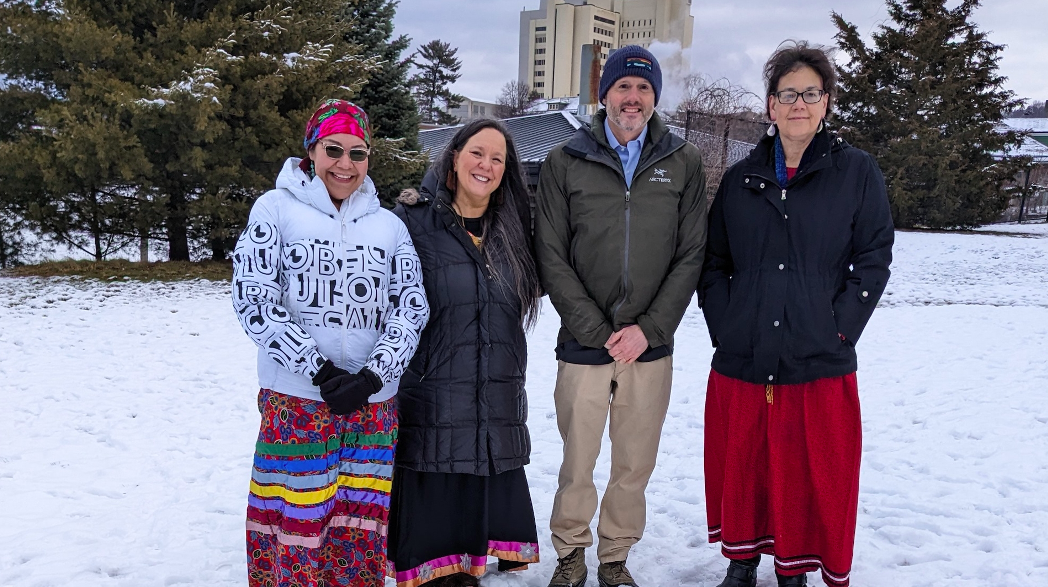This semester, the University of Massachusetts received the largest National Science Foundation (NSF) grant in its history to provide funding for the Center for Braiding Indigenous Knowledges and Science (CBIKS). CBIKS is a network of hubs throughout the country that conduct research with Indigenous communities around food security, climate change and cultural repatriation.
Per the efforts of Sonya Atalay, CBIKS director and provost professor of anthropology, the center will incorporate Indigenous knowledge into the scientific field combined with traditional Western science in an approach to address environmental challenges over a five-year period.
Indigenous methods of science focus on relational aspects between people and the environment, as well as relying on storytelling and oral history to pass down sustainable techniques that are important for climate change mitigation and cultural preservation.
“We’ve made fantastic scientific progress, but we think that there’s room and value with this approach, and it’s timely to have this additional focus on community-based research,” Jon Woodruff, a professor of earth, geographic and climate sciences and co-lead said.
To address these pressing challenges, CBIKS is composed of eight regional hubs, spanning across the United States, Canada, New Zealand and Australia to partner with 57 Indigenous communities on issues such as climate change. Over 30 indigenous scholars from universities throughout the U.S. are part of the center.
Woodruff noted that the center is built off partnerships with tribal scholars that are already taking action to leverage their work at the regional, national and global levels. One of the first few projects will focus on climate change documentation within indigenous Australian populations and Native Hawaiian food waste practices.
“This really comes out of Sonya’s vision, and she deserves much of the credit,” he said. “I’ve just been excited and honored to be part of this initiative.”
At the core of projects like these, researchers will produce guidelines throughout the process to relate to themes such as data sovereignty, training and engagement with federal agencies.
As Woodruff put it, the center serves to “really kind of braid in the Western approach,” hence the name. In Woodruff’s mind, the goal of CBIKS is to flip the way that science is done.
Another project will include collaboration with the Nanwalek community in Alaska to study preservation of salmon populations. Julie Brigham-Grette, professor of earth, geographic and climate sciences will work alongside James Temte from Alaska Pacific University, a member of the Northern Cheyenne tribe. The two will lead the Arctic and Alaskan Hub for CBIKS.
“I think that in the last 10 years, we’ve really seen a kind of a revolution and appreciation of the lived experiences of people who are in the Arctic,” Brigham-Grette said.
As a practicing geologist, Brigham-Grette studied the Arctic for nearly 40 years, where she worked up until Russia’s invasion of Ukraine. Brigham-Grette noted that when she started in the field, she felt that the research was purely “science extraction.”
“We went in, did our science and I wrote papers, but I never returned those papers to those communities where I was working,” Brigham-Grette said. “We did geological work, but we weren’t really studying the communities.”
In her role running the hub, she will work with communities that are counting salmon to understand population control and sustainability practices over time and observe the impacts that commercial fishing has on salmon fisheries.
Outside of food waste and climate change, data sovereignty is another area of research the center hopes to pursue. Anthropology graduate student Abigail Tomsen works underneath Atalay, studying indigenous archeology and examining museum collections throughout the country.
The application process took nearly a year-and-a-half, according to Tomsen, who worked on the application with Atalay and Woodruff and other members.
“We have a lot of existing relationships with Indigenous communities and this was an effort to sort of expand that,” Tomsen said.
Tomsen shared that she is also excited about potential research projects regarding water potability and clam gardens, which are human-made structures designed to enhance the productivity of clam beds.
CBIKS will apply for additional NSF funding after the five-year period ends.
“I think when you grow up and you’ve been taught that science is hypothesis based, observation and evidence based, it’s easy to think that that’s the only way of looking at the world and drawing conclusions,” Tomsen said.
Olivia Capriotti can be reached at [email protected].




















